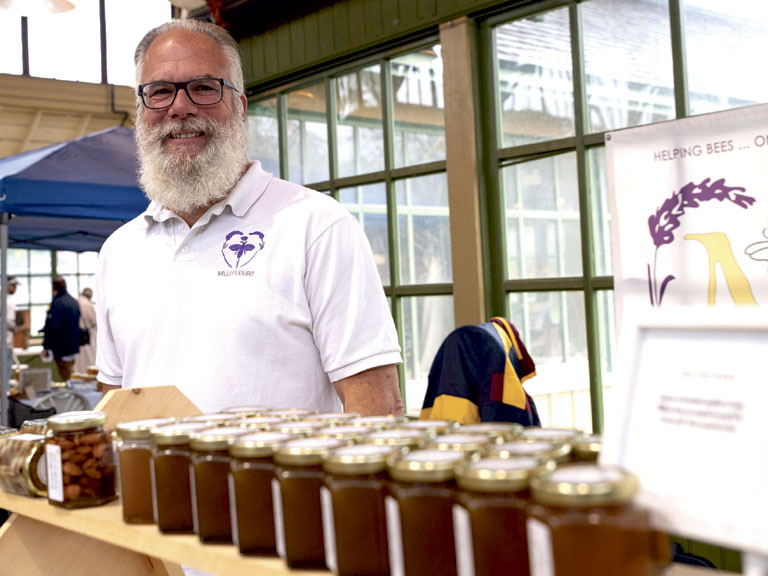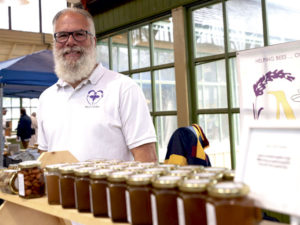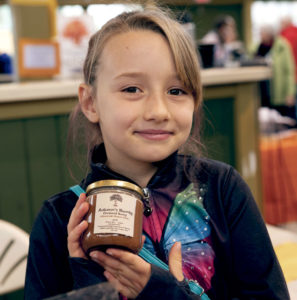County News
A honey of a festival

Inaugural festival for Ontario’s craft honey producers

Sylvain Segard of Millefleurs Farm with an array of his honey products.

Eight-year-old Autumn Bayard shows a jar of cocoa-flavoured honey made with honey from her hives.
The Crystal Palace was a hive of activity on Saturday for the inaugural Ontario Honey Festival, with almost 500 people attending the event. Organized by Natalie Comeau of the Prince Edward County Honey Company, the festival gathered 30 vendors of honey or honey-themed products for a day devoted to the sweet labours of the honeybee. Comeau was inspired by Maple in the County to create the festival. “Our maple syrup producers do Maple in the County every spring, and they support each other even though they’re doing the same product. They’re not competing against each other—they are working together,” she said. “And I thought if they can do it, the beekeepers can do it. And you really find out when you come to a festival like this, that honey isn’t just honey. Each area produces a slightly different tasting honey. We’ve got beekeepers here who have creamed honey, chocolateinfused honey, lavender honey, berry honey.” And there was much more than honey available at the festival. There were vendors of beekeeping supplies, a chocolate maker offering chocolate flavoured with bee pollen, soaps made with honey, beeswax candles, and beethemed books for children. “There’s all kinds of interpretations of making honey, so it’s not all the same and that’s something we want to promote here,” added Comeau. “And we want to promote the high quality honey that small producers are able to make.”
The festival also included a number of workshops about beekeeping and making products out of honey or beeswax. Rebecca Lamb of Hibernum Farms gave an introduction to the art of beekeeping, and noted with a smile that beekeepers are in fact farmers, and have a livestock herd of over 60,000 (tiny) animals. Other workshops provided information about how to make beeswax candles, how to make mead, and how to create a pollinator-friendly garden. The festival included a honey and mead competition. Unlike some other competitions, the honey was judged solely on taste, with the jars covered in tinfoil to mask the clarity and colour. “Smaller producers who do raw honey don’t have the ability to microfilter and so they are able to compete here,” explained Comeau. The mead bottles were also covered in foil, so the judges could rate the product on aroma and flavour and how it felt in the mouth, rather than on its colour and clarity.
The competition was sponsored by Dancing Bee Equipment Company, and the first prize for honey went to Martin McVety of Brighton, while Erwin Kooi of Kingston took top place for mead. County producers fared well, with Lise Bois coming in third place for honey, and Sylvain Segard taking third for mead.
Comeau said there’s been a substantial increase in the number of people making honey over the past few years. “There are a lot of hobby beekeepers who are doing what we call “sideliners”. They are selling honey, and it’s not their full-time job, but it’s a serious hobby.” The Ontario Ministry of Agriculture, Food and Rural Affairs (OMAFRA) is tasked with inspecting honey to ensure it meets provincial standards and is safe for consumption. Inspectors will purchase honey from suppliers and will let them know it is for the purposes of testing to ensure it is free of pesticide residue or antibiotic residue and meets labelling requirements. Comeau said that this year has been a good one for honey, with many people having bumper crops. “With the rain we had at the beginning of summer, it’s giving a milder, lighter honey.” One of the youngest honey producers was eight-year-old Autumn Bayard. She was given a hive—a pink one—for her fifth birthday by her parents who sell organic vegetables and honey through their farm, Autumn’s Bounty, in Cannington. Autumn now has 10 hives, and is quite knowledgeable about making honey and about the importance of bees to the food supply. Her favourite honey is cocoa-infused honey, which she helps to make. “I like how the bees collect the pollen, and for your favourite honey, you just have to put the flavour in,” she said. “If you didn’t have bees, the only thing you would have to eat would be weeds. Bees pollinate the flowers and most of our food.”

Comments (0)